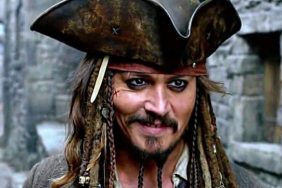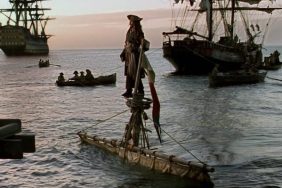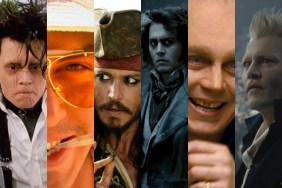“Welcome to my gloomy beige headquarters,” Geoffrey Rush laughs.
He’s right, of course. We’re sitting in two cushy chairs in a hotel room that has been stripped of almost all the other furniture, staring each other in the eye, blazingly aware of the artifice of our conversation. I’m a film critic, he’s an actor, and we’re supposed to talk about his latest movie, Pirates of the Caribbean: Dead Men Tell No Tales.
But Geoffrey Rush is anything but perfunctory. He’s made his Oscar-winning career playing scene-stealing eccentrics and deep thinkers. He’s taken part in a zombie sword fight and shot space slugs with rockets. He knows how to give a good interview, and in our relatively short time together he takes me inside the engaging thought process behind why he keeps returning to the Pirates of the Caribbean, why he gravitates towards outsider roles and more.
Pirates of the Caribbean: Dead Men Tell No Tales is in theaters now.

Disney
Crave: Whenever I see a Pirates of the Caribbean movie, I always think to myself that it looks like Geoffrey Rush is having the most fun.
Geoffrey Rush: Oh, really?
Is that the case? It seems like you get to have a blast.
Yeah, it is. Look, a fun project diminishes the whole experience, really.
Really?
Yeah, because it’s hard work. We’re on a very industrial work site, you know, particularly in the first chapters of the whole saga. I surprise myself that I had quite good sea legs. I was always very fearful. I don’t like the ocean. I’m not a natural swimmer, even though I come from Australia. That’s a terrible thing to say.
But you know, we were out day after day after day, week after week, going out on boats, and I’m an actor from the theater and I love props. So when they gave me the whole Black Pearl, with 80 pirates, and I was amazed how Disney let them be so grimy and gritty and disease-ridden and feral… but at the same time, with that reality, there was always these fantastical… it’s the folklore of piracy. The supernatural has come into almost every episode on some level.
But for me that’s meant that I’ve had the opportunity of working with actors, probably, that may never have happened in any other context. But I got to work with Chow Yun-fat and I got to work with Ian McShane from Deadwood. And I got to work with Bill Nighy, like, my vintage, a man of the theater. And now Javier Bardem. You know, these are rare treats, and on top of that the aberrant, absurdist chameleon brilliance of a Johnny Depp.
Yeah, it’s a no-brainer when every three or four or five or six years they say there’s another chapter coming up. There’s a pleasure in renegotiating with that caliber of performer.

Disney
It’s interesting… you look at your filmography and Pirates is kind of the one thing you keep coming back to over and over and over again. You’ve been playing Barbossa on-and-off for going on fifteen years.
Hmmm…
Does the character mean something to you in particular because of that?
[Laughs.] He’s not my alter ego. But no, he’s always been very transformational, and I’ve never felt as though… Right from the first film, when Johnny and Orlando and I were talking about, you know, we’re going to play pirates and it hasn’t been a successful genre for a very long time and people were very cynical about it’s based on a theme park ride. And Johnny kind of busted that wide open and said, we’ve got to excite the audience’s imagination with unpredictabilities. And I was a great fan of his independent era. You know, when he was doing What’s Eating Gilbert Grape or when he was doing Edward Scissorhads, and I just went wow, this guy has a loopy… he’s his own man, with his imagination.
When he came up with the idea, we started talking about British rock stars and we were trying to avoid the stereotypes of what we thought screen pirates should be about, and he was rather brilliant coming up with the idea. He said, “Well, I read the script and I looked for the little secret clues. They drink a lot of rum. What does that mean? What happens, you know what I mean? They’re in the sun. They’re fried. They’re wearing ridiculously heavy costumes,” which historically they did. They should have been in board shorts with a lot of Plus 50 sunscreen, but they didn’t. The genius idea that he came up with for Jack was getting the land legs and the sea legs completely wrong at any given moment in the script. And I just thought that was such an imaginative starting point.
And for me, in the first film, I was described before my entrance as someone who had been “spat out of the mouth of hell,” and you go well, you’d better bring something to the entrance that kind of warrants that reputation, you know? And then the writers kept morphing the character into different control freak personas. I became a kind of politician. I got to work with King George II. That was particularly appealing for me because I’d worked with Elizabeth I and I’d work with King George VI and I thought, is there a boxed set in that? “The Geoffrey Rush Collection of Royalty”, you know what I mean? [Laughs.]
That will make a great retrospective someday.
I don’t know. And then in this one of course, with the legacy of Blackbeard’s magic scimitar, he becomes a corporate CEO. An obscene, vulgar amount of wealth, and Barbossa is not a man of great style. He never once thought, “Maybe I should put some of this money into dental hygiene or buying some high-end face products to get rid of the crusty appearance.” There’s a fun side to that character and there’s also a kind of ruthlessness and narcissism that, it’s enjoyable to be able to paint a character with those kind of brush strokes.

Summit
I always respect how seriously you take every role, even if you’re in a broad narrative like the Pirates movies, or even Gods of Egypt where you got to shoot rockets at a space…
Slug. [Laughs.] Apophis, yes.
I was think to myself when I see a scene like that, “Does he ever realize how weird it is what he’s doing right now?”
Oh yeah. You’re totally aware of it. Particularly on Gods of Egypt because that was blue screen ecstasy. I’m an old theater actor. We’re used to that. You know, often on a set you don’t have all the trappings and all the detail that the CGI palette can give you, and someone will just point a laser light up on the blue screen and say… well, they’d show the art work or the pre-vis, the artistry behind the creation of what will end up on the screen… and you go, “Your character does this every day or their life. They’ve got to conquer the demon of the night so that Egypt can live comfortably.” So you have to pull out all the stops of what makes that character tick.
I read somewhere that you played Snoopy on stage once.
I did!
What is the secret to playing Snoopy?
It’s like any of these characters. I sort of gravitate, not necessarily towards an eccentricity… I feel if I choose to look with some hindsight at the accumulation of what is an ongoing rough and tumble, unpredictable career, choosing jobs that – I don’t know – differ from the one before, you know what I mean, whatever chemistry goes into what would be fun to spend three months of my life or six months of my life with… they’re always the outer concentric circle.
You know, the hero of the Peanuts is Charlie Brown. I play the dog that sleeps on the top of his dog box who’s a philosopher. I’m drawn to that. So I’m drawn to Barbossa as I’m drawn to Einstein, because they are outsiders, and I suppose as a character actor that’s the turf that you’re locked into, in a way.
The Top 25 Best Disney Villain Songs:
Top Photo: Rich Polk/Getty Images for Disney
William Bibbiani (everyone calls him ‘Bibbs’) is Crave’s film content editor and critic. You can hear him every week on The B-Movies Podcast and Canceled Too Soon, and watch him on the weekly YouTube series What the Flick. Follow his rantings on Twitter at @WilliamBibbiani.
The Top 25 Best Disney Villain Songs
-
25. The World’s Greatest Criminal Mind

The villainous Rattigan, a mouse version of Sherlock Holmes' arch-nemesis Moriarty, has some bragging to do. The villain of The Great Mouse Detective has a somewhat forgettable musical number but Vincent Price seems to be cherishing every note of it.
Photo: Disney
-
24. I'm Mean

The off-kilter, slightly off-key songs of the underrated Popeye include a funny but understated villain number for Brutus (better known as "Bluto" in the cartoons), who wants you to know that he's mean. You know what he means...
Photo: Disney
-
23. The Siamese Cat Song

Catchy but guilty of distasteful racial stereotyping, the villain song from Lady and the Tramp may be historically noteworthy but nowadays it's pretty darned difficult to enjoy.
Photo: Disney
-
22. The Marvelous Mad Madam Mim

A zesty villain number from the energetic Mad Madam Mim, the witch who torments a young Arthur in The Sword in the Stone. It's a very fun tune but it just doesn't have much of an impact compared to most of these other villain songs.
Photo: Disney
-
21. Every Little Piece

The underrated original version of Pete's Dragon features two unforgettably nasty villain songs. The first on our list is a disturbing little number from two snake oil salesman who fantasize about cutting pieces off of the title character. Yikes.
Photo: Disney
-
20. Heffalumps and Woozles

"Heffalumps" and "woozles" probably don't exist but that doesn't stop Winnie the Pooh from having a vivid, trippy nightmare about them stealing his honey in this freaky-deaky song from The Many Adventures of Winnie the Pooh.
Photo: Disney
-
19. I'm Number One

Muppets Most Wanted was a mostly forgettable movie, but the villain had a couple solid songs in him. In "I'm Number One" he reminds his henchman Ricky Gervais who's on top by literally dancing on the actor's head.
Photo: Disney
-
18. Les Poissons

It should be a comic relief number but in a world where most of our heroes are at least part fish, a ditty about a chef who lives for cooking the supporting cast comes across as impressively ghoulish.
Photo: Disney
-
17. The Happiest Home in These Hills

The hero of the original Pete's Dragon has been purchased by a despicable family who, in their big number, try to convince him to come home but can't resist yelling about how they're going to saw him in half and eat him for dessert. It's a weird movie but these villain songs stick out in the best possible way.
Photo: Disney
-
16. Shiny

Jemaine Clement plays a crab obsessed with sparkly baubles in Moana, and he has a show-stopping number explaining the importance of all that flare. "Shiny" is a great song but it doesn't fit very well with the rest of the film, digressing from both the plot and overall musical style.
Photo: Disney
-
15. Let's Talk About Me

Villain songs don't exist in a vacuum. If you were to listen to "Let's Talk About Me" without seeing the rest of The Muppets it might just seem like a lark. But the way this song plops into the film with almost no provocation whatsoever, combined with its brazen self-congratulatory weirdness, and the fact that Oscar-winner Chris Cooper is the one rapping its lyrics, make it a classic gag song.
Photo: Disney
-
14. Friends on the Other Side

The toe-tapping villain song from The Princess and the Frog might come across like a simple knockoff of Ursuala's number from The Little Mermaid, but this particular offer to make a deal with the devil gets bonus points for its glorious animation, styled after blacklight paintings and voodoo symbolism.
Photo: Disney
-
13. I'll Get You What You Want (Cockatoo in Malibu)

The second villain song from Muppets Most Wanted is an infectious ditty, in which the evil Constantine - who has been unconvincingly impersonating Kermit the Frog - appeals to Miss Piggy's vanity by offering her literally everything she wants. Catchy and insidious and, when the "thingy-thing" shows up, wonderfully absurd.
Photo: Disney
-
12. Mother Knows Best

One of Disney's most subtly despicable villain songs finds a kidnapper, Gothel, manipulating her "daughter" using subtle psychological abuse. The music makes it sound loving, but that only makes the cruelty of the lyrics all the more disturbing.
Photo: Disney
-
11. Sarah's Theme (Come Little Childen)

Disney's cult favorite Hocus Pocus may not be a musical (and Bette Midler's cover of "I Put a Spell On You" doesn't count), but this creepy lullaby sung by Sarah Jessica Parker - designed to lure children to their demise - has rightly become iconic to a generation. It's a silly film, but it's an eerie song.
Photo: Disney
-
10. Trust in Me (The Python's Song)

Another seductive lullaby, this time from the villainous snake Kaa, who has hypnotized the man-cub Mowgli into following his every malicious word. The clever use of Kaa's malleable body and the calming, friendly delivery by the great Sterling Halloway help make it a classic.
Photo: Disney
-
9. The Mob Song

Most villain songs are sung by or about individual villains, but the disturbingly rousing "Mob Song" from Beauty and the Beast casts all of society - manipulated by a fear-monger via great publicity - as the real monsters. It's a suspenseful number that perfectly captures the message of one of Disney's best films.
Photo: Disney
-
8. Oogie Boogie's Song

Lots of villains in musicals get show-stopping numbers about their own personal greatness, but few seem to relish their moment in the spotlight more Than the Oogie-Boogie Man in The Nightmare Before Christmas. He's not just singing, he's practically headlining in Vegas. He gets points for presentation.
Photo: Disney
-
7. Poor Unfortunate Souls

Of all the Disney songs by villains who want to lure a hero to the dark side, "Poor Unfortunate Souls" is easily the most convincing. Ursula has a devil's bargain to strike with The Little Mermaid, and she we'd make that deal too, thanks to a song that feigns pity for the hero's plight and a spectacular animated and vocal performance.
Photo: Disney
-
6. The Headless Horseman

None other than the great Bing Crosby sings this spectacular campfire song from The Adventures of Ichabod and Mr. Toad, in which Brom Bones warns a timid schoolteacher about the supernatural villain that haunts the woods. "The Headless Horseman" is an iconic example of Disney showmanship.
Photo: Disney
-
5. Kidnap the Sandy Claws

Few other Disney songs can claim to be as mean-spirited and nightmarish as "Kidnap the Sandy Claws," a song by the Nightmare Before Christmas villain's henchmen, all about their evil plans to abduct a beloved childhood hero and torture and murder and eat him. Jeepers.
Photo: Disney
-
4. Cruella De Vil

One of Disney's most iconic villains is such a detestable character that the heroes of 101 Dalmations have written a song about how much they hate her. They even don't break into spontaneous song. Roger is a songwriter who actively uses his skills to compose a ditty about how much she sucks. The damnedest thing is he was underselling his point. Cruella De Vil is so wicked she actually seems to deserve this treatment. Maybe she should be honored... after all, "Cruella De Vil" is one of the catchiest villain songs ever written.
Photo: Disney
-
3. Gaston

By the time the villagers sing a rousing barroom chanty to the greatness of town hero Gaston, nobody has any idea he's a villain yet... including Gaston. That's what makes this Beauty and the Beast centerpiece so unnerving. It demonstrates just how seductive shallowness can be, and how inspired the masses sometimes are by charismatic blowhards. Brilliant and - not for nothing - endlessly hummable.
Photo: Disney
-
2. Be Prepared

Few Disney villains have the same breadth of vision as Scar, the usurper of the throne in The Lion King, who murders his own brother and - in the behind-the-scenes scheming song "Be Prepared" - organizes an army of hyenas to usher in a new era of outright fascism. The music is great, Jeremy Irons sells the cocksure villainy, and the imagery is particularly haunting, inspired by Leni Riefenstahl's horrifying pro-Nazi propaganda film The Triumph of the Will.
Photo: Disney
-
1. Hellfire

Judge Frollo is on a completely different level of Disney villainy, a hypocritical religious leader who oppresses the disfigured and - in a musical number so incredibly subversive it's hard to believe Disney even tried selling to audiences (let alone succeeded) - decides that if he can't have sex with the woman who fills his heart with lust, he will murder her. "Hellfire" is operatic in the extreme, as big a statement as Disney has ever made, as powerful a descent into the concept of Hell as an animated family movie has ever dared. And when placed in contrast with the song that immediately precedes it, the earnest and heavenly "Heaven's Light", this number comes across as especially perverse. Villain songs don't get much more desperate and villainous.
Photo: Disney








